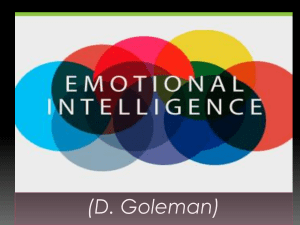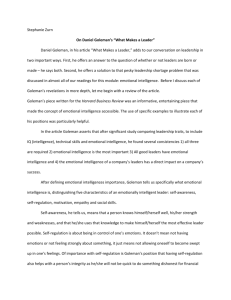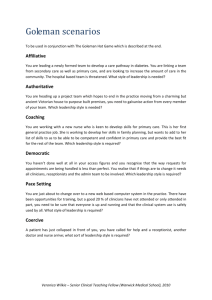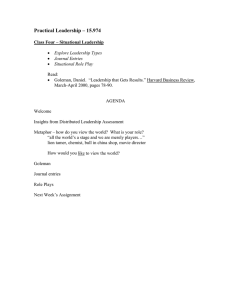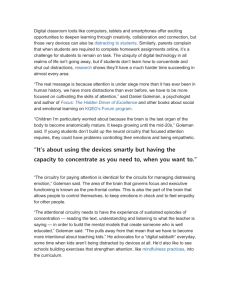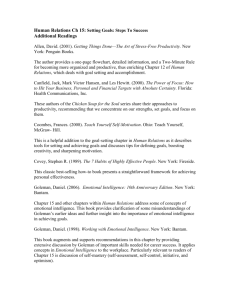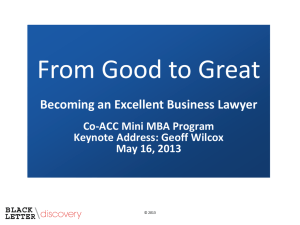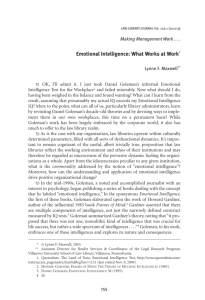Module 4 Summary
advertisement
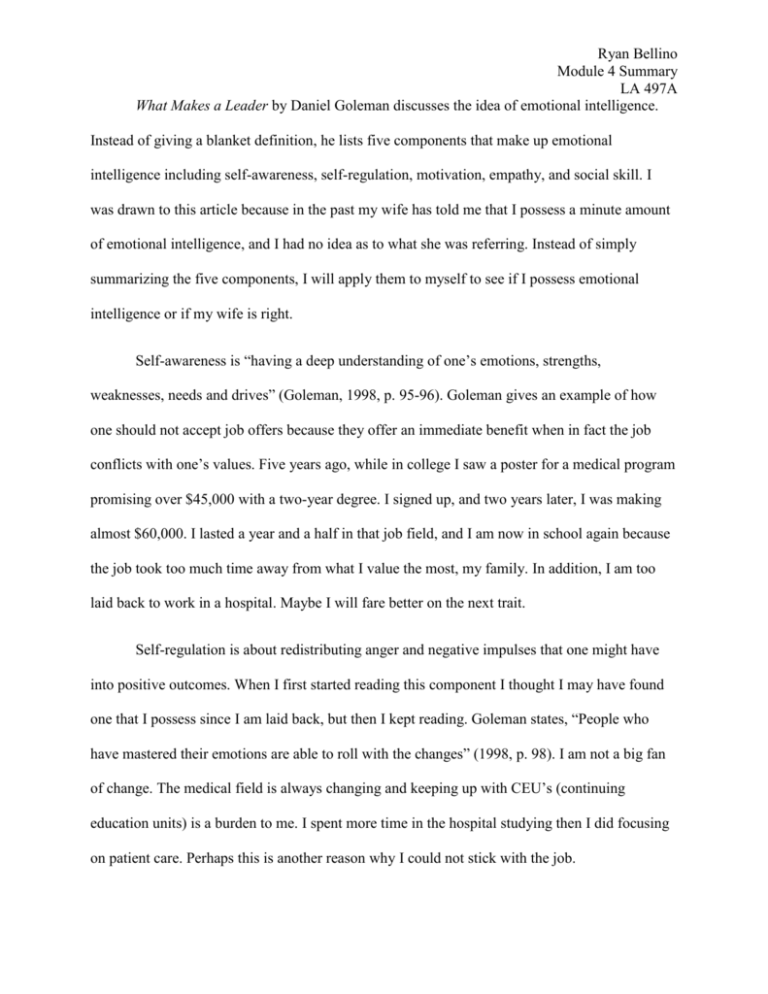
Ryan Bellino Module 4 Summary LA 497A What Makes a Leader by Daniel Goleman discusses the idea of emotional intelligence. Instead of giving a blanket definition, he lists five components that make up emotional intelligence including self-awareness, self-regulation, motivation, empathy, and social skill. I was drawn to this article because in the past my wife has told me that I possess a minute amount of emotional intelligence, and I had no idea as to what she was referring. Instead of simply summarizing the five components, I will apply them to myself to see if I possess emotional intelligence or if my wife is right. Self-awareness is “having a deep understanding of one’s emotions, strengths, weaknesses, needs and drives” (Goleman, 1998, p. 95-96). Goleman gives an example of how one should not accept job offers because they offer an immediate benefit when in fact the job conflicts with one’s values. Five years ago, while in college I saw a poster for a medical program promising over $45,000 with a two-year degree. I signed up, and two years later, I was making almost $60,000. I lasted a year and a half in that job field, and I am now in school again because the job took too much time away from what I value the most, my family. In addition, I am too laid back to work in a hospital. Maybe I will fare better on the next trait. Self-regulation is about redistributing anger and negative impulses that one might have into positive outcomes. When I first started reading this component I thought I may have found one that I possess since I am laid back, but then I kept reading. Goleman states, “People who have mastered their emotions are able to roll with the changes” (1998, p. 98). I am not a big fan of change. The medical field is always changing and keeping up with CEU’s (continuing education units) is a burden to me. I spent more time in the hospital studying then I did focusing on patient care. Perhaps this is another reason why I could not stick with the job. Ryan Bellino Module 4 Summary LA 497A Motivation is apparent in people who “are driven to achieve beyond expectations-their own and everyone else’s” and “to achieve for the sake of achievement” (Goleman, 1998, p. 99). This component is one that I have no problem displaying. Even though I hated my year and a half at the hospital, I still gave it my all. The last thing I want is for someone to think I am a slacker. Normally a technologist will train for a year before advancing to other technology realms, but I was moved up after only six months. After a year, I had more responsibilities than most technologists who had been there for five years. Not being great at my job is not an option for me no matter how much I dislike it. Empathy, as defined by Goleman is “thoughtfully considering employees’ feelings – along with other factors – in the process of making intelligent decisions” (1998, p. 100). I have had many managers in the past, and I can say that Goleman is right; empathy is not a trait that is seen or shown in the workplace. For this reason, I have always thought that I would make a lousy manager because I am empathic. I think that it is frowned upon because it is confused with being emotional, which is considered a weakness. Empathy is nothing more than listening, understanding, and applying what is learned to decisions that are being made about the person or persons. This is very much a strength, and I am glad to possess it. Social Skill is when people “have a wide circle of acquaintances, and they have a knack for finding common ground with people of all kinds” (Goleman, 1998, p. 101). This is a tough component to apply to myself. I am a stay-at-home dad and therefore do not get out much. I do not have any friends, acquaintances or co-workers at this time, but I have in the past and have been able to get along with all types of people. A friend in high school told me that I was somehow different because I did not belong to a certain clique; instead, I was friends with a few people from all the cliques throughout the school. Goleman mentions the ability to work in teams Ryan Bellino Module 4 Summary LA 497A and being “expert persuaders” as a quality of social skill. Although I do not prefer teams, when I am relegated to a team, such as every day in the hospital, I am considered the peacekeeper. I like to smooth out the rough edges of the team so that it functions better. Burke mentions social skill in his article Why Leaders Fail and states that leadership derailment can be due to an “inability to adapt to a boss with a different style” (1983, p.241). Goleman says that the first three components are about self and the last two are about others. Apparently I am more comfortable and in tune with others than I am with myself because I have motivation, empathy and social skill. Self-aware and self-regulation are amiss, but I think I can say that I have more than a minute amount of emotional intelligence. As Goleman says, it can be learned; I just have to want to learn it. My wife will be proud.
